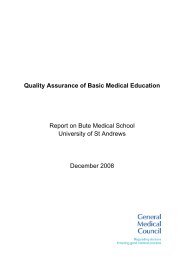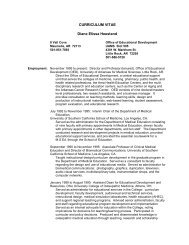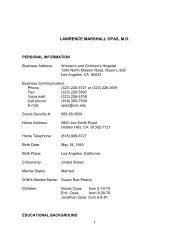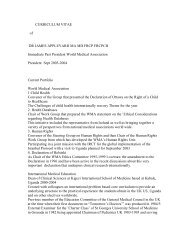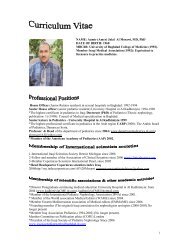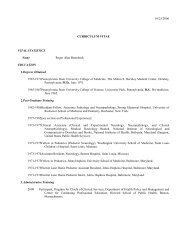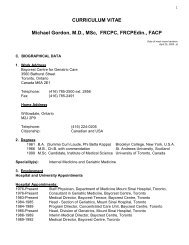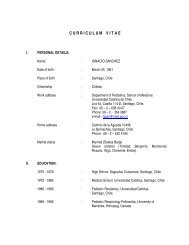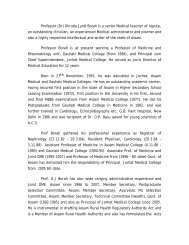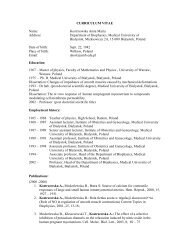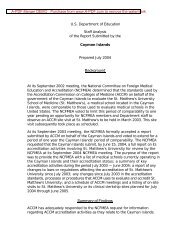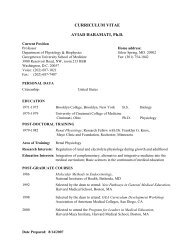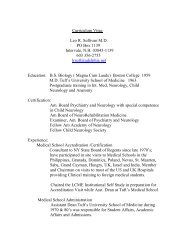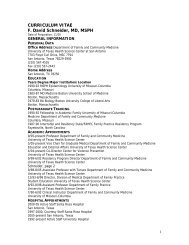ELIZABETH KRAJIC KACHUR, Ph.D. - IAOMC
ELIZABETH KRAJIC KACHUR, Ph.D. - IAOMC
ELIZABETH KRAJIC KACHUR, Ph.D. - IAOMC
Create successful ePaper yourself
Turn your PDF publications into a flip-book with our unique Google optimized e-Paper software.
War Related Illness and Injury Study Center (WRIISC) - DVA NJ Health Care System; East Orange, NJ; 2004<br />
• Opportunities and challenges of educating clinicians about the psychosocial aspects of bioterrorism and disaster<br />
medicine (Kachur E, Freeman R)<br />
AAMC; Washington, DC; 2003<br />
• Psychosocial aspects of bioterrorism: Preparing physicians utilizing an evidence-based, experiential model, and<br />
multi-modal evaluation (Freeman R, Kalet A, Kachur E, Zabar S, Lipkin M)<br />
• Bioterrorism preparedness and medical education (Kachur EK, Coico R, Lipkin M, Terndrup T, Freeman R)<br />
• OSCE stations for cultural competence education (Kachur E, Altshuler L, Rosen J, Langenau E, Spatz E)<br />
• Communications training improved student performance – Findings from a controlled 3-school experiment (Yedidia<br />
M, Gillespie C, Kachur E, Schwartz M, Ockene J, Chepaitis A, Snyder C, Lazare A, Lipkin M)<br />
Generalists in Medical Education; Washington, DC; 2003<br />
• How to develop Objective Structured Teaching Exam (OSTE) stations (Kachur E, Schwartz M, Zabar S, Kalet A, Morrison<br />
E)<br />
• Unearthing medical education literature (Kachur E, Schwartz M, Kalet A, Comerci T, Altshuler L)<br />
Mt. Sinai Educational Research Day; New York, NY 2003<br />
• OSCE stations for cultural competence education (Altshuler L, Kachur E, Langenau E, Schaeffer H, Shelov S)<br />
• Does an OSCE at the beginning of residency training predict attendings’ post-rotation trainee evaluations in the first<br />
year (Schaeffer H, Kachur E)<br />
AAPP; Baltimore, MD; 2003<br />
• Practicing bioterrorism-related communication skills with Standardized Patients (SPs) (Zabar S, Kachur E, Kalet A,<br />
Triola M, Yedidia M, Freeman R, Blaser M, Steigbigel N, Lipkin M)<br />
• The use of Objective Structured Clinical Exams (OSCEs) to assess the communication skills of Pediatric residents<br />
with parents of a newborn with Down Syndrome (DS) (Barrett S, Hilfer A, Altshuler L, Kachur E)<br />
• Interview teaching cases – Medical student and faculty preferences (Tso A, McCoy W, Kachur E, Nunes J, Santana A,<br />
Edelsack P, Raggio T, Gold M)<br />
• Measuring communication skills with the help of Objective Structured Clinical Exams (OSCEs) - Quality indicators<br />
applied to a literature review (Kachur E and the Review of Communication Skills Assessment Tools (ROCAT/BEME) Group)<br />
• Teaching communication skills pays off: Findings from a controlled, three-school experiment (Yedidia M, Gillespie C,<br />
Kachur E, Schwartz M, Ockene J, Chepaitis A, Snyder C, Lazare A, Lipkin M)<br />
• The development and use of a Substance Abuse Objective Structured Clinical Examination (OSCE) (Stein M, Parish S,<br />
Kachur E, Arnsten J)<br />
• The impact of formative Culture OSCEs on resident performance (Altshuler L, Kachur E, Aeder L, Barrett S, Koepfer S,<br />
Kruger H, Hilfer A, Schaeffer H, Shelov S)<br />
IAMSE; Washington, DC; 2003<br />
• A Delphi study to develop guidelines for bioterrorism curricula (Coico R, Kachur E, Lima V, Lipper S)<br />
• Best Evidence Medical Education (BEME) and its impact on basic science teaching and learning (Harden R, Lilley P,<br />
Kachur E)<br />
Pediatric Academic Societies; Seattle, WA; 2003<br />
• Culture OSCEs: Do they work (Altshuler L, Kachur EK, Aeder L, Kruger H, Hilfer A, Schaeffer H) (abstract published in<br />
Pediatr Res 53:88A (#495), 2003)<br />
AERA; Chicago IL; 2003<br />
• Discussant for the session: Forces shaping curricular change<br />
SGIM: Mid-Atlantic Regional Meeting; Baltimore, MD; 2003<br />
• How to find and evaluate medical education literature (Kachur EK, Schwartz M, Kalet A, Comerci T)<br />
• A workshop with gynecologic teaching associates (GTAs) improves internal medicine providers’ breast exam skills<br />
(Hanley K, Kachur K, Zabar S, Capponi LJ, Bateman W)<br />
• Measuring residents´ teaching competence: developing a methodology (Zabar S, Hanley K, Kachur E, Stevens D, Kalet<br />
14



